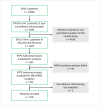Prediction of metachronous advanced colorectal neoplasia by KRAS mutation in polyps
- PMID: 39400528
- PMCID: PMC11578838
- DOI: 10.1002/ueg2.12667
Prediction of metachronous advanced colorectal neoplasia by KRAS mutation in polyps
Abstract
Background: The potential of molecular markers in the removed polys as reliable predictors of metachronous lesions is still uncertain.
Aim: Our aim was to evaluate the role of somatic mutations in KRAS in polyps of patients with high-risk adenomas to predict the risk of advanced polyps or colorectal cancer (CRC) within 3 years.
Methods: A total of 518 patients were prospectively enrolled. The included patients had adenomas ≥10 mm, high-grade dysplasia, villous component or ≥3 more adenomas at baseline and were scheduled to undergo surveillance colonoscopy at 3 years ± 6 months. Somatic KRAS mutation was performed on 1189 polyps collected from these patients. At surveillance, advanced lesions were defined as adenomas with a size of ≥10 mm. High-grade dysplasia or villous component, serrated polyps ≥10 mm or with dysplasia or CRC.
Results: At baseline, 81 patients (15.6%) had KRAS mutations in at least one polyp. Patients with KRAS mutated polyps had more frequent villous histological lesions and size ≥20 mm. In the multivariate analysis, adjusted for age and sex, only age (odds ratios [OR], 1.06; 95% confidence interval [CI], 1.02-1.09; p < 0.001), ≥5 adenomas (OR, 3.92; 95% CI, 1.96-7.82), and KRAS mutation (OR, 2.54; 95% CI, 1.48-4.34; p < 0.01) were independently associated with the development of advanced lesions at surveillance.
Conclusions: Our results show that, in patients with high-risk adenomas, the presence of somatic mutations in KRAS is an independent risk factor for the development of advanced metachronous polyps.
Keywords: KRAS mutation; colonic polyps; colorectal cancer; surveillance; tumor markers.
© 2024 The Author(s). United European Gastroenterology Journal published by Wiley Periodicals LLC on behalf of United European Gastroenterology.
Conflict of interest statement
The authors declare that they have no known competing financial interests or personal relationships that could have appeared to influence the work reported in this paper.
Figures
References
-
- Global Cancer Observatory . Globocan. Global Cancer Observatory; 2020.
-
- Gupta S, Lieberman D, Anderson JC, Burke CA, Dominitz JA, Kaltenbach T, et al. Recommendations for follow‐up after colonoscopy and polypectomy: a consensus update by the US multi‐society task force on colorectal cancer. Gastroenterology. 2020;158(4):1131–1153.e5. 10.1053/j.gastro.2019.10.026 - DOI - PMC - PubMed
Publication types
MeSH terms
Substances
Grants and funding
LinkOut - more resources
Full Text Sources
Medical
Miscellaneous


